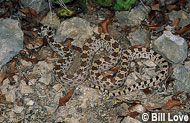Description:
Wild bullsnakes can be irascible and unapproachable, but after a short time in captivity many become quiet and handleable. Besides the typical dark saddled tan phase, bullsnakes are now available in a number of designer colors and patterns. This snake breeds readily in captivity. Both wild caught and captive bred bullsnakes are readily available in the pet trade. Hatchlings vary from about 11 inches (small-sized adults) to 16 inches (large adults). A clutch normally contains from 4 to 15 large eggs. Occasional females may lay up to 26 eggs and double clutching has been documented. Bullsnakes are rather slow moving powerful constrictors that are easily approached in the wild. They are active in the evening and nighttime hours. Bullsnakes seek sanctuary in rodent burrows, old buildings or piles of debris. Because they are not speedsters they can be maintained in terraria smaller that those recommended for other snakes of similar size. One or two babies may be temporarily housed in a 10 or 15 gallon capacity terrarium. A pair of adults may be kept in a 50 gallon capacity terrarium. The terrarium should contain a hide-box and assorted visual barriers (such as cork bark or sterilized drift wood). Bullsnakes can climb well and if provided with firmly anchored limbs of no less diameter that the girth of the snake, they will do so. Cypress, fir, aspen chips or bark shards provide an easily cleaned and inexpensively replaced substrate. A temperature of 78 degrees Fahrenheit at night and 85 degrees during the day is ideal for these snakes. Although they may not bask, a hot spot of 90 to 95 degrees is provided for several hours a day. A bowl of clean water should always be present and if the receptacle is large enough the bullsnakes may crawl in and soak as they begin their shedding cycle.
Habitat:
A snake of semiarid and aridlands, the bullsnake wanders widely, but is most often seen in and near clumps of vegetation or along watercourses or crossing roadways near livestock watering tanks.
Range:
Over most of its range this is an abundant snake. Its range extends southward from the southernmost Canadian provinces of Alberta and Saskatchewan to the state of Tamaulipas in northeastern Mexico.
Scientific Name: Pituophis catenifer sayi
Species Group:
Family: Colubridae
Size: Adults of this hefty snake differ in size populationally. Some may be adult at 3 to 4 feet. Most routinely attain a length of 6 to 7 feet. The largest authenticated example was 8⅓ feet long.
Level: intermediate
Weight:
Dangerous: No


